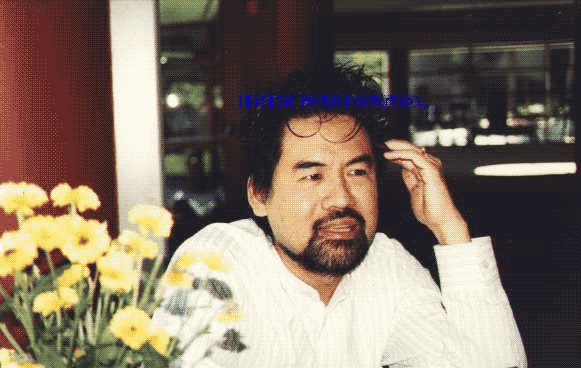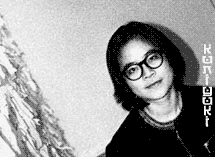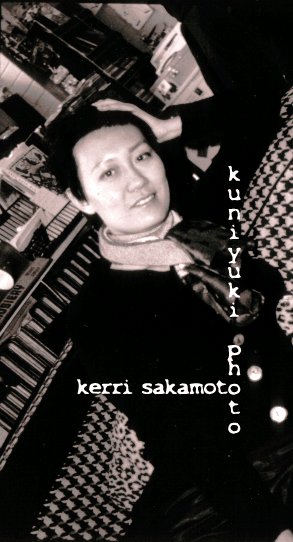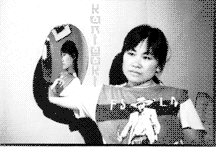 |

1999

DAVID HENRY HWANG
EARLIEST CHILDHOOD MEMORY?
i do, but i don't think they are particularly interesting. my
earliest childhood memory is probably sitting on the counter in the kitchen watching my mother... i have a memory of wanting--really
wanting one of those 'slippy-slides. where you have the big piece of vinyl that you put down and run a hose down it-! I REALLY
wanted one of those! my parents got me one and i invited a bunch of kids over to do it and for some reason..i was like suddenly
scared to go on it myself. That's a few childhood memories!
CHILDHOOD FAVORITE COLOR
Green, i think.
FAVORITE COLOR NOW
I like that burnished...um..to be honest, I really like purple.
HAVE U EVER HAD A
PARANORMAL EXPERIENCE?
I used to have a ..well, I don't know if it's a paranormal experience or psychologically weird--uh,
I used to have sleep paralysis. It's like one of those Maxine Hong Kingston stories where the ghost is sitting on you! Laughter.


Lynne
Yamamoto, 1998.
What's your earliest childhood memory?
God,
I really..they're really dumb ones, though. Like playing hopscotch and slipping and falling on the back of my head. Being
tumbled in--I used to visit my grandmother on the island of Lanai and there's this beach that we always used to go swimming
in and before I knew how to swim really well--if you get caught in the wave, it tumbles you. So I remember being tumbled by
the wave and all the water going in your nose and feeling like you're completely drowning. I can't remember anything else.
It's hard for me to remember that far back, actually.
Even if it's not even that far back?
Oh,
well I think another one was that my brother and I climbed on top of the bathroom sink and were playing with water and we
got the bathroom all wet and so my mom made us go to bed or something like that.
Did
you have a favorite color when you were a child?
-I don't think so. Not that I recall, actually.
Do you have a favorite color now?
-It depends on what it's for. I really like purple. I guess that's
my favorite color.
Deep purple, or what shade of
purple?
Blue-violet.
My favorite color.


In what ways did your political or community
activism influence the subject of what you write about or your approach to writing? Well, it's hard to say because it's all integrated in a
way. I guess I would say what I learned about internment. It was definitely something that made me very angry and was very
sad and tragic to me. I think one phase of my life--doing very concrete kind of activist work--was a really helpful and healthy
outlet for me. There was this point where I stepped back and started to write more about it.
What kind of writing did you do?
I guess I was turning to my own personal
writing by then that had to do with my own sense of my self in the world. When I was growing up, my mother had this picture
of her brother who had died in the internment camp sitting in the dining room. He was always this person she always talked
about, and aunts and family friends talked about [him] as this really special person. He died at age nineteen I the camp.
That was sort of the focal point in relation to internment. I related to it through my mother's sadness about it. She had
been twelve or thirteen when he died, and I just couldn't imaging going through that experience of being in this camp in this
really desolate place, sitting by your brother's bedside as he died. I've always admired my mother that she went through this
experience and thought what a strong person she was.
You said that when you first starting writing it was
about exploring your sense of self in the world.
What do mean by "sense of self?"
I guess that had a lot to do with racial identity
and being racially different, growing up in a mainly white suburb, and in coping with that difference. Racism was definitely
part of my childhood.
When you first starting writing, what kind of writing
was it? Fiction.
I started writing [as an] undergraduate. I took one of those writing workshop classes and wrote intensely
personal stories that were really about being different racially in terms of the body. Feelings of alienation, about not fitting
in the white ideal of beauty. And I also wrote about my uncle, his death.
You focus a lot on the body and physical detail--whether
they're imperfections, or people's self-perceptions.
Can you talk about ways that you use the body in your
writing and why? The
racist persecution of Japanese Canadians and Americans really has to do with the physical difference. It's not like there
were Germans who were interned in the same way Japanese Canadians were. I think it was really clear that it was because they
racially different. They were the racial "other." When you look back at old archival images from newspapers in British Columbia
dating back to when the Japanese first came, you see the depictions [are] so hideous and ugly.
I think when people go through
this experience of racism, they start to internalize that, and start to feel that they themselves are ugly.
Another thing Irene and
I notice is the use of hair. I guess that kind of goes along with use of the body and other physical characteristics, but
can you talk about -
-what hair means to you and why you use it
in your work? Well, I think, as you say, hair is like a key racial signifier of difference. But also, in the novel
itself, it's also something that is a point of beauty, say, for the character Chisako. I guess in that way, I was influenced
by some Japanese writers. I guess the first writer who influenced me in that way was Kawabata Yasunari. When I first read
him in my early twenties I had a sort of revelation, I guess. He eroticizes the Japanese woman's body, and the way he describes
hair--black hairas not simply being black, but different shades of black. And to discover the beauty in that--in black hair--but
also the nuances of it and the variations within it. That sense of aesthetics, I guess, was kind of a revelation to me.
How do you respond
to the criticism that by identifying as an "Asian Canadian" writer you are ghettoizing yourself?
I dont have that problem, because I feel like theres a need for work about Asian Americans and Asian
American experiences. Theres a need for representation. Even though theres so many Asian Americans and (Asian) Canadians in
North America, theres such a dearth of images. I feel there's that need. I dont really have a problem with that--feeling ghettoized--but
to be honest, I feel like the Asian Canadian/ Asian American audience is the most important audience to me. I dont want to
be exclusive, but I speak to that audience first.
continued.

|
| CCL and his Interviewers at Saigon Pearl! |
 
YONG SOON MIN/installation artist
What generasian are u?
1.5
What the Koreans would call "1.5",
but closer to "1.8", between first and second generation--an immigrant-technically, i've been here so long..assimilated.
Can u speak Korean?
..at a three year old's level, no writing or reading.
Any proverb than informs
u and your work?
-It depends on what fortune cookie I have?
Live Fast, Die Young?
[this interview conducted
in the car while sightseeing in Seattle]
How do u define identity, what role does it play in your life?
-----Identity,
the big I-word, it's a very complex matter..i think, um, i guess .. I position myself in many ways at different times, different
situations, different ways.
...emphasize different parts of my identity: female, korean, asian, third world--it's contingent
and variable.
Is there anything essential about being Asian, Asian American & Korean American?
-------That's
also contingent. There may be times when it becomes politically viable and necessary to become essentialist about Korean.
To be able to organize and bring together a group of people under that rubrick.
On a theoretical level there's a lot
of problems with it.
Do u ever censor yourself?
-----I don't want to think that i do. But i probably do only
in so for as--one major question that always enters into the making of a work, is the consideration for the audience.
A concious consideration, there may be entering into the work some censorship ..who am i speaking to?..what target audience?..primary
audience, but not exclusive to.

a conversation with Miya Masaoka, 1996:
I: What did u find most interesting about the Ainu (people)?
What was the most interesting aspect of Ainu culture to u?
M: the people, how open they were, how interested they were in Japanese American
existence and experience.
I met the leading Ainu activist in the world.. we had this communication, and she's taught
me traditional Ainu songs and has invited me to what she calls 'Ainu Land' performing with Ainu musicians and Ainu people..we
had this very strong bond.
For her, she identified more with me as a Japanese American, than with Japanese in Japan.
Minorities here (in Japan) have experienced racism and different kinds of discrimination, was something she could relate to
as an Ainu woman.
The discrimination of Ainu people is very strong in terms of jobs, schools, socially,
economically..in any of those situations.. we had a very strong bond from the beginning.
I: Can u describe how their music is different from the mainland?
M: The Ainu music is very, very different from mainland Japanese, just
as the language, and everything else about Ainu culture.
The scales are different, and certainly the Ainu language is different. Ainu music
very much resembles most indigenous and native music. Like for example, Native American music in terms of the tones
and the singing. It's very engaging and it's really fascinating how much of their culture resembles Native American culture.
The singing, there's different rounds that the women sing, their instruments...
For example, there is an Ainu koto called the TONKURI,
it's shaped different from the Japanese koto. It has a little ball inside, a little piece of wood, you can kind of clang around
and you can hear it... this is the SOUL of the instrument. That's where it connected to the idea that Shintoism actually shares,
that the instruments have souls and plucking the strings for example is a way to release the sound and to release the
soul of an instrument. So that REALLY affected me, I incorporate THAT into
my being, and into the approach I play music.

|
 |

